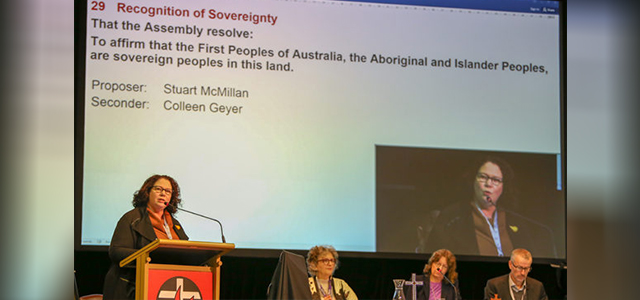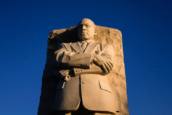
Reflection: Sovereign Peoples

Among many heavy decisions that were made at the Assembly meeting in Melbourne, one was the following: That the Assembly resolve: to affirm that the First Peoples of Australia, the Aboriginal and Islander Peoples, are sovereign peoples in this land. Not many words there, but big implications for us. What does this statement mean?
“Sovereignty” is a complicated and controversial concept; the word itself is fraught with misrepresentation and poor definition. For a state to be sovereign in international law is to have ultimate authority against which there is no appeal. For First Peoples to be recognised as sovereign in Australia looks different. Adding to the dilemma, Australia’s First Peoples never relinquished their sovereignty over the land, since they never signed a treaty, war was never declared, and the land was not terra nullius.
On top of this, we as Christians have some overarching concepts in the Bible that play into this issue. First, God’s story of the creation of humanity from the dust of the earth – what does it mean for us to own, till and conquer lands, when we have been created from that same land? Next, the Israelite right of conquest (as seen in Deuteronomy, Judges, Joshua and other OT texts) – God’s chosen people were ordained to conquer Other lands, for the sake of God’s promises being fulfilled. Do we therefore worship a God that made all people in God’s image, but then chose one land/people for particular blessing and the right to conquer others? What is the relationship between faith and nationalism? Next, the conviction of white superiority, often supported by the curse of Ham in Genesis 9, and the synthesis that from then, there was a universal curse on black peoples, condemning them to inferiority and slavery. Does God actually favour certain ethnicities and cultures over others? Finally, the sovereignty of God (e.g. Psalm 103) which asserts that God’s kingdom rules over all. Is anyone sovereign at all?
So, who is sovereign in Australia? If First Peoples are (still) sovereign, who recognises that sovereignty? Does affirming First Peoples as sovereign mean responding to a call for separatism, as per the conversation in Sri Lanka, where the call for Tamil sovereignty is actually a call for a separate, autonomous state?
I don’t believe so. Recognising and affirming First Peoples as sovereign is much less about law and power as it is about humility in acknowledging the following:
- Australian politics operate under the same Euro-centric construct of sovereignty, which might be outdated.
- Up until very recently, Australian politics has attempted to make First Peoples disappear (Stolen Generation, denying citizenship, not acknowledging in census data).
- We have much to learn from our Indigenous brothers and sisters about what it means to tread lightly upon the land God created.
- The Church treats churches as sacred sites, but are part of the system that devalues sacred natural sites.
- We must take seriously Acknowledgements of Country in all aspects of our life, to ground ourselves as an Australian church, gathering on stolen land.
Affirming the above statement doesn’t solve anything, per se. But it is a statement of humility and identity, as a truly Australian church.
Radhika Sukumar-White is Minister of the Word at West Epping Uniting Church.
This reflection first appeared on West Epping Uniting Church’s website




























































